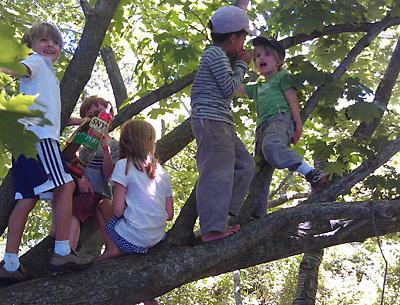Crash Course in Country Childhood

It really wasn’t all that long ago when most people in the world knew which herbs, wild-growing fruits and vegetables, and tree barks were good to eat or to cure what ailed you. However, through industrialization and general busyness, it is a skill that we, as a people, largely lack today.
Now Mark Mobius, a teacher from the Hayground School who served in the Peace Corps and holds a master’s degree in environmental management from Duke University, is looking to change that, at least for the younger set.
The EcoDiscovery Experience offers young children, ages 5 to 7, a chance this summer to hunt for salamanders, snack on wild berries, climb trees, and “learn about a diverse range of natural history topics, wilderness skills, and country wisdom,” according to its brochure.
So what exactly does Mr. Mobius mean by “country wisdom”?
“It’s a broad subject area,” he said. “It encompasses some things I think people learn just by spending time in rural areas, and other knowledge that gets passed down through generations by people who live close to the land and sea.”
Mr. Mobius, a native Shelter Islander, recalled that when he was a child “we always anticipated the arrival of weakfish to our local waters by watching for the lilacs to bloom.” Country wisdom also includes finding and using native plants and developing a general awareness of nature “that has historically been useful in rural life,” he said. “It’s like a crash course in being a country kid.”
He emphasized that the EcoDiscovery Experience isn’t a summer camp, per se. There are only two groups, each with a maximum of eight kids and three staff members. “Having such a small group allows us to cover a lot of ground and change course easily,” he said. Also, he said, activities won’t be repeated, so “a participant could join us for a day or a week and have a great time, or could spend all eight weeks with us and never get bored.”
The classes will meet on Shelter Island at Sylvester Manor, the 243-acre nonprofit educational farm and historic plantation, and in Amagansett at the Peconic Land Trust’s preserves. “We get access to a lot of places and trails where summer camps can’t go because of their size,” Mr. Mobius explained.
The programs run through July and August, and Mr. Mobius is looking forward to finding the treasures of nature with his groups.
“Box turtles are an increasingly rare treasure to run across in the woods,” he said. “Berries — it’s amazing how motivating a berry patch can be once the kids learn how delicious wine berries, blackberries, and blueberries are. And I always love to find things interacting — bugs and plants, roots and rocks, wind and seeds — anything that makes you ask why or how.”
“What I’d really like for the kids to get out of the program is an awareness of, comfort in, and a respect for nature,” Mr. Mobius stated. “These traits will allow them to learn many more lessons than any summer program could teach.”
Mr. Mobius can be e-mailed at [email protected].
